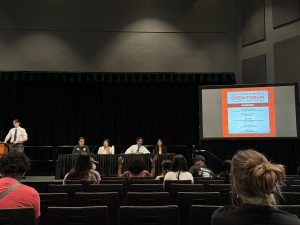The details of the TPM—including masking bans, curfews for being present on campus, and other matters of assembly that are normally left up to the discretion of the campus administration—are just a few of the many concerning details of the proposal from the Chancellor’s Office,” said Danielle Spratt, vice president of the CSUN Faculty Senate. “These details, along with the problematic implementation of the new proposed policy, combine to, in the words of the resolution, “threaten academic freedom” on our campus.”
On Oct. 10, 2024, the CSUN Faculty Senate unanimously voted to pass a Resolution on Noncompliance to the CSU Interim Time, Place, and Manner Policy (TPM) asserting that the policy “infringes on democratic rights to assemble and protest on campus.”
The Systemwide TPM Interim Policy, implemented by directive of CSU Chancellor’s Office, outlines prohibited activities on CSU campuses and when, where, and how certain activities, such as protests and gatherings, may be conducted on university property.
The faculty senate resolution lists several reasons for its decision, including that senate leadership received no prior notification of the policy before it was announced to all faculty members, and that the policy could lead to increased policing of engaged students and faculty from racially minority backgrounds.

“The faculty leads on this resolution outlined eloquently and persuasively multiple reasons for noncompliance, including CSUN’s vibrant history of student and faculty activism, which led to the landmark establishment of many of our internationally renowned ethnic studies departments, as well as our campus’s commitment to supporting social and racial justice and upholding the democratic freedoms of our campus community,” said Spratt. “In addition to these campus-specific reasons, the resolution joins those of many of our sister CSUs in citing that the updated TPM policy is currently under legal review for non-compliance.”
According to the faculty senate’s union, the California Faculty Association (CFA), the Chancellor’s Directive “failed to bargain in good faith with the CFA,” prompting the union to file an unfair practice charge.
The Associated Students Senate and Board of Directors, considered the primary advocate for CSUN students, have not taken an official stance on the Faculty Senate resolution.
“Both Vice President Khan and I support the resolution and understand the reasoning behind it. We deeply appreciate the Faculty Senate’s commitment to addressing institutional concerns and strongly align with their efforts to advocate for what is right,” said AS President Katie Karroum. “As a voting member of the Faculty Senate, I voted in favor of the resolution, including amendments I proposed to extend its reach to additional relevant bodies, which passed with majority support.”
The AS President’s support of the faculty senate reflects that protecting student and faculty rights is a shared priority of AS and the senate.
“The Faculty Senate Resolution has a significant impact on our student body, as it reflects the faculty’s strong belief that core aspects of student life at a public university—such as free speech and assembly—should be upheld without restriction. At a diverse institution like CSUN, these rights are integral to the holistic student experience,” said Karroum. “This resolution demonstrates that the faculty, as the working body of CSUN and the CSU system, care deeply about shared governance in policy making and recognize the vital role that both students and faculty play in shaping the university’s identity.”
The Chancellor’s Office has faced major criticism for the rushed implementation of the policy but has yet to announce adjustments in response to widespread dissatisfaction across CSU campus. However, the office is currently meeting with its union to discuss the policy.
“The Chancellor’s Office respects and appreciates all viewpoints from members of our campus community,” said Amy Bentley-Smith, CSU spokesperson, in response to the CSUN Faculty Senate resolution. “The Chancellor’s Office welcomes and considers stakeholders’ concerns, and is currently meeting and conferring with our unions, including the California Faculty Association. CFA represents all faculty members at the 23 universities.”
The Chancellor’s Office previously asserted that the interim policy does not inhibit individuals’ rights to freedom of expression and protects those who engage in lawful activities. However, Bentley-Smith said the meet and confer process could result in revisions to the policy.
“Meeting and conferring is intended to discuss concerns, propose changes, and work towards an agreement in good faith,” said Bentley-Smith.
Earlier this month, an AS Time, Place and Manner Open Forum provided a venue for where participants learned more about the new regulations and voiced their concerns directly to campus leadership.
Students will have more opportunities to express their opinions and learn more about this issue.
“Associated Students Senate meetings are held every Monday at 9 a.m. in the USU Northridge Center. These meetings include an open forum for any member of the CSUN community to address the Senate. Additionally, all standing committee meetings are open to the public and have an open forum segment. The External Affairs Standing Committee, which frequently discusses this topic, meets on Mondays from 12 p.m. to 1 p.m. in the USU Executive Board Room on the third floor of the Sol Center,” said Karroum.
Karroum also encourages concerned students to attend the California State Student Association’s monthly meetings to participate in their open forum discussion, as well as consider meeting individually with herself and AS Vice President Iman Khan. Personal meetings can be scheduled via email at president@csunas.org and vicepresident@csunas.org.
“We anticipate that discussions surrounding the CSU Systemwide Interim Time, Place, and Manner Policy will continue for some time,” Karroum said. “Although AS does not have direct jurisdiction over how this policy is implemented at CSUN or within the CSU system, we remain committed to advocating for student interests. This core value guides us, even when there may be disagreements with campus partners.”






